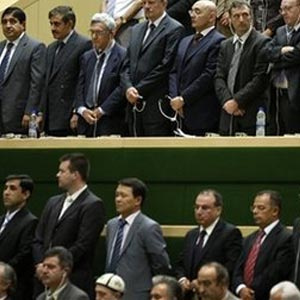Un-Negligible Iran

Ahmadinejad’s inauguration was held in a tense atmosphere on Wednesday in the Iranian parliament (Majles). While it was thought that after their harsh remarks following the early days of post-election demonstrations the European countries would abstain from sending their representatives to the ceremony, their ambassadors were present in Baharestan yesterday.
Last week, Iranian Diplomacy had quoted from Iranian Students News Agency (ISNA) and aSharq alAwsat on the chances of Europeans’ attendance in Ahmadinejad’s inauguration. The analyses were based on Italian Foreign Minister Franco Frattini’s remarks stating that if invited, the European ambassadors and representatives will attend Ahmadinejad’s the ceremony in which Ahmadinejad is sworn.
On Wednesday 5th of August global media reported that the Swedish ambassador (whose country has taken over the European Union presidency) has attended the inauguration. The same day, media reported that United States will acknowledge Mahmoud Ahmadinejad as Iran’s president. However, Angela Merkel spokesman had said that she will not congratulate Ahmadinejad with his controversial re-election. Nicholas Sarkozy and the French diplomatic apparatus have also cast doubts on Ahmadinejad’s reelection as the Iranian president.
The question is why did the Europeans change their idea and decided to attend the ceremony? Hadn’t they doubted the validity of an election which led to Ahmadinejad’s re-presidency? Hadn’t they expressed concerns about Iran’s post-election developments? Then why did they attend his inauguration ceremony?
A closer look from a diplomacy-based point of view at EU stances and demands can provide us with the answer. First of all is Europe’s worry about Iran’s nuclearization. It seems that they will never stop trying to find out what they think of as the true nature of Iran’s nuclear activities. When Gholam Hosein Aghazadeh, head of the Iranian Atomic Energy Organization resigned, rumors spread that Iran is seeking nuclear weapons and in six months, it will carry out its first N-bomb test in Dasht-E-Lut. The source was Russian news agency RIA-Novosti. At any rate, there were efforts to link Aghazadeh’s resignation to weaponization of Iran’s nuclear program. Although commander of the Iranian Revolutionary Guards General Ja’fari denied Iran’s quest for nuclear weapon, the rumor developed in the resignation-denial period and added to West’s concerns. The September deadline set for Iran was concurrent with these rumors.
But West does not want to confront Iran. They are already bogged down in Afghanistan and Iraq and know well that if they open a third front against Iran, gates of hell will open to them. Iran is not Iraq or Afghanistan, so West has to select negotiations which implicate maintaining relations with Iran and holding the grounds for talks.
Europe wants to continue relations with Iran at any price and it can not simply ignore this country. If they make that mistake, Russia and China are ready to replace Europe in Iran’s economic and energy sections which would be a disaster for Europe amid the global economic crisis. Europe knows that Iran is the second oil producer in OPEC and its economic exchange with China is valued at 30 billion dollars. International sanctions have not even stopped France from broad cooperation with Iran in car industry.
In addition to economic interests, Europeans have a lot to share with Iran in politics. Iran is located in a geopolitically and strategically significant region. Overlooking this fact can harm Europeans’ interests not only in Iran but in other countries such as Afghanistan, Palestinian, Iraq, Lebanon, Syria, Latin America and even Europe.
Also, West is in a predicament. Iraq and Afghanistan are its toughest international challenges. The troubles in Iraq may have become less arduous, but Afghanistan is still problematic. The case of Afghanistan has stirred debates in Britain, Germany and France among statesmen. NATO is seeking ways to come out of the Afghan quagmire, while Pakistan is becoming an issue itself. Amid this turmoil, Iran is a stable country. West never wishes for Iran’s instability since it would be the link that completes the chain of turmoil from Iraq to Afghanistan. West needs a stable Iran which can control its borders.
To achieve what it wants, West has to talk to Iran. The prerequisite to negotiations is the existence of ’diplomatic houses’. These diplomatic houses are called embassies and they link Tehran to their country. Hence, they have no way other than appeasing Tehran and trying to cope with it. Additionally, West has prioritized negotiation with Iran which implicates withdrawal in some cases, such as attendance in Ahmadinejad’s inauguration in the Iranian parliament.

